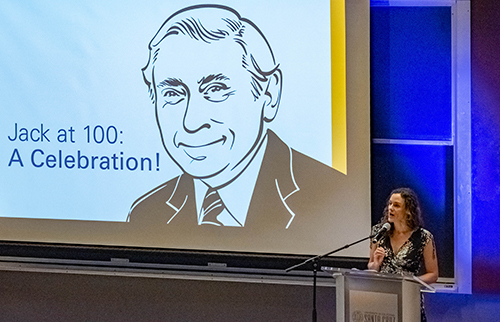Campus News
Jack Baskin at 100
UC Santa Cruz celebrates the centenary of Jack Baskin, a pivotal donor whose generosity has shaped the university and benefited causes throughout the Monterey Bay area




Joining you in the Jack Baskin auditorium at the Jack Baskin School of Engineering were recipients of several academic chairs and endowed professorships bearing his name, as well as Peggy and Jack Baskin Presidential Chair for Feminist Studies Bettina Aptheker.
Alexander Wolf, dean of the Jack Baskin School of Engineering, convened the event, which highlighted Baskin’s dedication to the campus and numerous significant contributions stretching back to its founding. The presenters portrayed a man with an able wit who knew how to leverage generous gifts to make big changes.
“Jack’s generosity and impact is truly unsurpassed at UC Santa Cruz, the City of Santa Cruz, and the Monterey Bay area,” Wolf said. “He has a knack for doing the right thing at the right time.”
Among these propitious acts was Baskin’s response to the floods that devastated several Santa Cruz County neighborhoods in 1982. Recognizing that the community lacked an institution to focus philanthropic resources on local causes, Baskin helped organize what is now Community Foundation Santa Cruz County.
“Jack is a feminist”
Peggy and Jack Baskin Foundation Executive Director Nicole Baran, who is also Baskin’s granddaughter, emphasized Baskin’s deep concern with social issues.“You may not think of a 100-year-old white man and feminism,” Baran said. “But after all these years, I can say Jack is a feminist.”
In foundation board meetings, Jack Baskin would be upset about the challenges of homeless women or immigrant families separated at the border, Baran said. And in addition to its support for UC Santa Cruz, the Peggy and Jack Baskin Foundation funds organizations that support and advocate for immigrants and low-income women.
“He recognizes his privilege came with responsibility,” Baran said.
Daughter Elaine Baskin said she holds her father as a role model who worked hard, invested wisely, and made a difference with his philanthropy.
Born to low-income parents who had immigrated from Russia, Baskin studied engineering and designed aircraft during World War II. After the war, Elaine Baskin explained, Jack Baskin knew returning soldiers would need homes. He moved to Los Angeles and became a general contractor, building tract houses. In the 1960s he moved to Santa Cruz and made a business of building housing throughout the Bay Area for seniors and low-income residents.
“He was proud of building quality homes,” Elaine Baskin said.
Bringing engineering to campus
Baskin served on the UC Santa Cruz Foundation Board of Trustees for more than 30 years and advocated steadily for the campus to train engineers, said Professor Pat Mantey, who was the first dean of the engineering school.With a $1 million gift in 1984, Baskin made it possible to establish an engineering department in what was then called the Applied Sciences building (now Engineering 1). Some of the funds were used to build dedicated space (now the Elena Baskin Visual Arts Center) for the Arts Division, which then occupied part of the building.
Baskin endowed a chair of computer engineering, which Mantey has held since 1988. The steady stream of funds enabled Mantey to direct resources to numerous projects, including the first high-power computers for the effort to sequence the human genome.
“With Jack’s money in my pocket I had freedom to do things I couldn’t do otherwise,” Mantey said.
In 1997, Baskin’s years of advocacy for engineering, along with a $5 million gift, culminated in the establishment of the Jack Baskin School of Engineering.
Following the presentations, numerous members of Baskin’s family mingled with faculty, staff, and community members. Baskin was not able to attend; however, his daughter Marianna Mejia and stepson Nicholas Baran said their father would have enjoyed the event.
“He’d probably be really proud,” Mejia said. “He’d be thinking about what else he could do.”
“Now I can give back”
Beatriz Collazo, a biomedical engineer, said she’d learned about the possibilities in engineering from Girls in Engineering, a program established with funds from the Baskin Foundation. The program provides math and science instruction for middle school girls in Watsonville and the Salinas Valley and an engineering summer camp at UC Santa Cruz.She earned a degree at Stanford University and now builds medical devices at Duke Empirical.
“Girls in Engineering really helped launch my career,” Collazo said. “It helped me see engineering is more than programming, it’s problem solving.”
Another GIE aluma, Aleida Diaz Roque (Oakes ’23, computer engineering), had her introduction to coding through the program.
Diaz Roque said members of her family have faced health problems, and part of her motivation to become an engineer is to build health-related technologies.
“I was inspired by Jack Baskin’s story, that his parents were immigrants like mine,” she said. “Now I can give back to my community, thanks to him.”